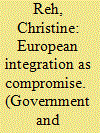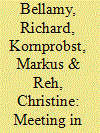|
|
|
Sort Order |
|
|
|
Items / Page
|
|
|
|
|
|
|
| Srl | Item |
| 1 |
ID:
114811


|
|
|
|
|
| Publication |
2012.
|
| Summary/Abstract |
The role of compromise in EU politics has been widely recognized by scholars and practitioners alike. At the same time, the systematic conceptual, analytical and normative study of compromise has remained an exception. This is surprising, given that the study of compromise can be linked to three broader questions at the heart of integration: (1) How does the EU accommodate diversity? (2) What makes supranational rule normatively justifiable? (3) Who or what defines the limits of cooperation? Against this backdrop, this article sheds light on the concept of compromise, on the role of compromise in legitimizing supranational governance and on the limits to compromise in the European polity. I argue that the EU - a divided, multilevel and functionally restricted polity - is highly dependent on the legitimizing force of 'inclusive compromise', which is characterized by the recognition of difference. This is true for horizontal or micro-level relations between political actors (where compromise works through concessions as well as justification, perspective-taking and empathic concern in a process of 'procedural accommodation'), and for vertical or macro-level relations between systems of governance (where compromise works through 'constitutional compatibility'). Given the legitimizing force of inclusive compromise, I subsequently identify the limits to such agreements and, thus, to supranational cooperation; I argue that these limits are issue specific and depend on where the costs of cooperation are borne. The article concludes by outlining routes for follow-up empirical research.
|
|
|
|
|
|
|
|
|
|
|
|
|
|
|
|
| 2 |
ID:
114805


|
|
|
|
|
| Publication |
2012.
|
| Summary/Abstract |
Compromise is routinely evoked in everyday language and in scholarly debates across the social sciences. Yet, it has been subjected to relatively little systematic study. The introduction to this inter-disciplinary volume addresses the research gap in three steps. First, we offer three reasons for the study of compromise: its empirical omnipresence in politics, its theoretical potential to bridge the rationalist-constructivist divide, and its normative promise to recognize the plurality of society. Second, we introduce different approaches to the coherence, legitimacy and limits of compromise found in the existing explanatory and normative literatures. We discuss why these literatures need to speak to one another, and identify possible applications in empirical research. Third, we conceptualize compromise as one possible solution to a conflict. Distinct from both dissensus and consensus, all compromises share three characteristics: concessions, non-coercion and continued controversy. However, different types of compromise can be distinguished by how mutual, costly and painful concessions are; by whether all forms of coercion are absent; and by the degree to which the relevant parties' grounds for conflict are transformed. We conclude by discussing the challenge and appeal of 'politics as compromise' in plural and complex societies.
|
|
|
|
|
|
|
|
|
|
|
|
|
|
|
|
|
|
|
|
|